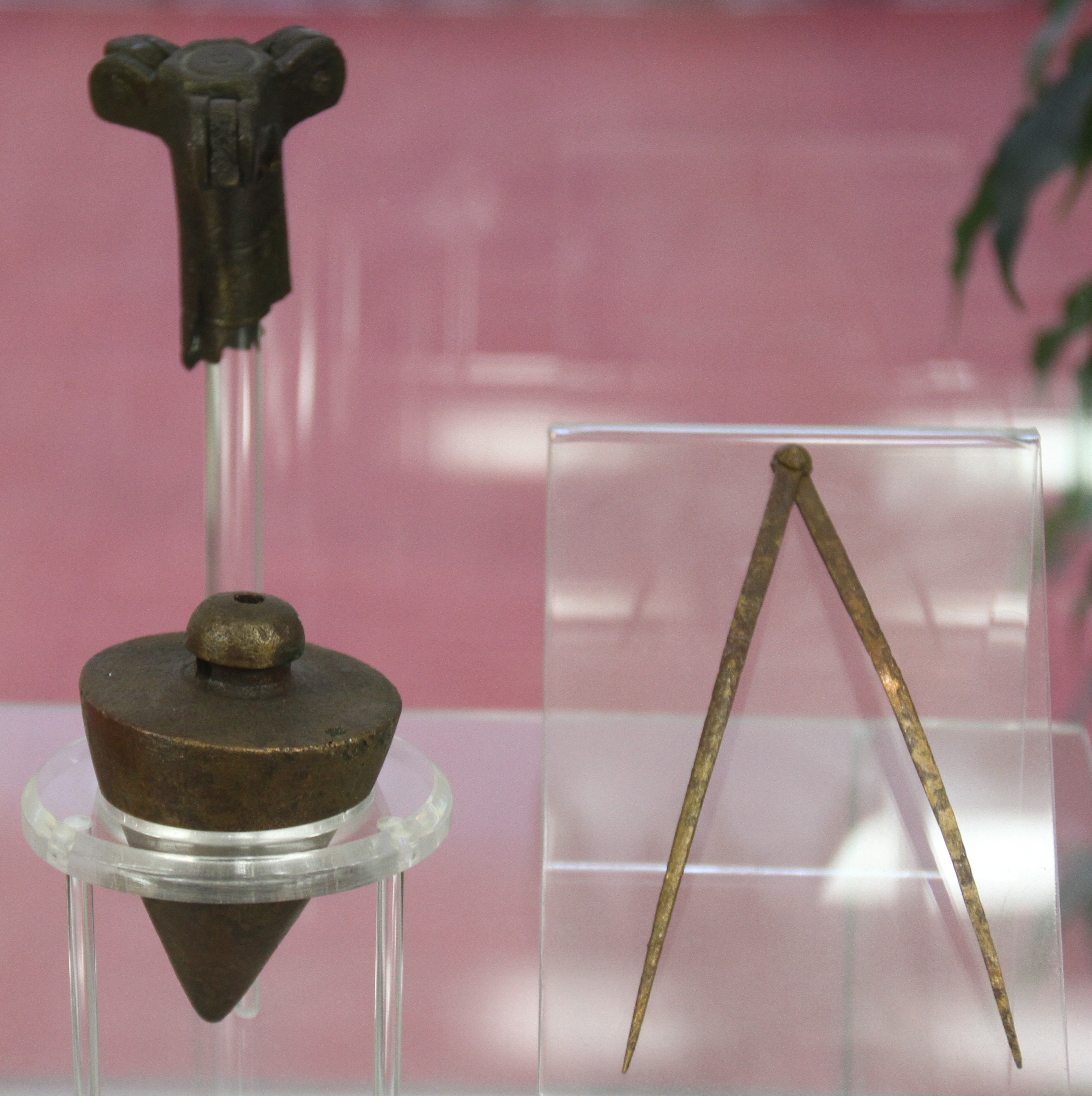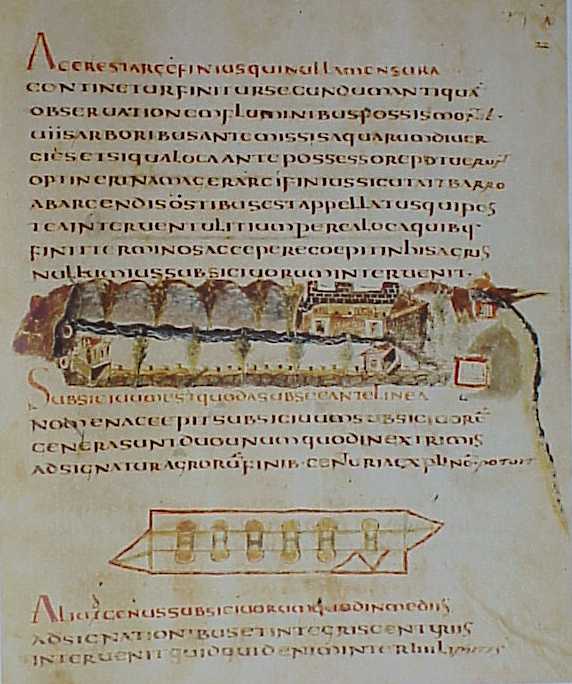|
Gromatici
''Gromatici'' (from Latin '' groma'' or ''gruma'', a surveyor's pole) or ''agrimensores'' was the name for land surveyors amongst the ancient Romans. The "gromatic writers" were technical writers who codified their techniques of surveying, most of whose preserved writings are found in the ''Corpus Agrimensorum Romanorum''. History Roman Republic At the foundation of a colony and the assignation of lands the auspices were taken, for which purpose the presence of the augur was necessary. But the business of the augur did not extend beyond the religious part of the ceremony: the division and measurement of the land were made by professional measurers. These were the ''finitores'' mentioned by the early writers, who in the later periods were called ''mensores'' and ''agrimensores''. The business of a ''finitor'' could only be done by a free man, and the honourable nature of his office is indicated by the rule that there was no bargain for his services, but he received his pay in ... [...More Info...] [...Related Items...] OR: [Wikipedia] [Google] [Baidu] |
Corpus Agrimensorum Romanorum
The Corpus Agrimensorum Romanorum (Corpus of Roman Land Surveyors) is a Roman book on land surveying which collects works by Siculus Flaccus, Frontinus, Agennius Urbicus, Hyginus Gromaticus and other writers, known as the Agrimensores ("land surveyors"). The work is preserved in various manuscripts, of which the oldest is the 6th or 7th-century Codex Arcerianus. Contents and authors The ''Corpus'' consists of a number of texts with different contents, composed at different dates. The Codex Arcerianus alone contains 33 separate works, most of which are the writings of the Agrimensores. These writings were clearly written as textbooks or manuals for working land surveyors. The most important authors in the collection are Frontinus (1st century AD), Agennius Urbicus (5th or 6th century), Hyginus Gromaticus, Siculus Flaccus (2nd century), and Marcus Junius Nipsus (2nd century). Another important component of the work are the ''Libri Coloniarum'' ("Books of Colonies"), lists of su ... [...More Info...] [...Related Items...] OR: [Wikipedia] [Google] [Baidu] |
Hyginus Gromaticus
Hyginus Gromaticus (Gromaticus from '' groma'', a surveying device) was a Latin writer on land-surveying, who flourished in the reign of Trajan (AD 98–117). Fragments of a work on boundaries attributed to him are found in ''Corpus Agrimensorum Romanorum'', a collection of works on land surveying compiled in Late Antiquity. The 'surname' Gromaticus ("surveyor") is a false attribution. Origin of the epithet "Gromaticus" Hyginus Gromaticus (''Gromaticus'', meaning "surveyor," derives from groma, a measuring instrument used by ancient Roman surveyors) is known only from his work ''De Constitutione Limitum'' (On the Establishment of Boundaries) in the ''Corpus Agrimensorum Romanorum'', a collection of works on land surveying compiled in Late Antiquity. He probably lived between the end of the first century AD and the reign of the Emperor Trajan. His epithet "Gromaticus" is a false reading which goes back to the oldest manuscript, the ''Codex Arcerianus'', in which the subscript ... [...More Info...] [...Related Items...] OR: [Wikipedia] [Google] [Baidu] |
Hyginus Gromaticus
Hyginus Gromaticus (Gromaticus from '' groma'', a surveying device) was a Latin writer on land-surveying, who flourished in the reign of Trajan (AD 98–117). Fragments of a work on boundaries attributed to him are found in ''Corpus Agrimensorum Romanorum'', a collection of works on land surveying compiled in Late Antiquity. The 'surname' Gromaticus ("surveyor") is a false attribution. Origin of the epithet "Gromaticus" Hyginus Gromaticus (''Gromaticus'', meaning "surveyor," derives from groma, a measuring instrument used by ancient Roman surveyors) is known only from his work ''De Constitutione Limitum'' (On the Establishment of Boundaries) in the ''Corpus Agrimensorum Romanorum'', a collection of works on land surveying compiled in Late Antiquity. He probably lived between the end of the first century AD and the reign of the Emperor Trajan. His epithet "Gromaticus" is a false reading which goes back to the oldest manuscript, the ''Codex Arcerianus'', in which the subscript ... [...More Info...] [...Related Items...] OR: [Wikipedia] [Google] [Baidu] |
Surveyor (surveying)
Surveying or land surveying is the technique, profession, art, and science of determining the terrestrial two-dimensional or three-dimensional positions of points and the distances and angles between them. A land surveying professional is called a land surveyor. These points are usually on the surface of the Earth, and they are often used to establish maps and boundaries for ownership, locations, such as the designed positions of structural components for construction or the surface location of subsurface features, or other purposes required by government or civil law, such as property sales. Surveyors work with elements of geodesy, geometry, trigonometry, regression analysis, physics, engineering, metrology, programming languages, and the law. They use equipment, such as total stations, robotic total stations, theodolites, GNSS receivers, retroreflectors, 3D scanners, LiDAR sensors, radios, inclinometer, handheld tablets, optical and digital levels, subsurface locators, d ... [...More Info...] [...Related Items...] OR: [Wikipedia] [Google] [Baidu] |
Land Surveyor
Surveying or land surveying is the technique, profession, art, and science of determining the terrestrial two-dimensional or three-dimensional positions of points and the distances and angles between them. A land surveying professional is called a land surveyor. These points are usually on the surface of the Earth, and they are often used to establish maps and boundaries for ownership, locations, such as the designed positions of structural components for construction or the surface location of subsurface features, or other purposes required by government or civil law, such as property sales. Surveyors work with elements of geodesy, geometry, trigonometry, regression analysis, physics, engineering, metrology, programming languages, and the law. They use equipment, such as total stations, robotic total stations, theodolites, GNSS receivers, retroreflectors, 3D scanners, LiDAR sensors, radios, inclinometer, handheld tablets, optical and digital levels, subsurface locators, dron ... [...More Info...] [...Related Items...] OR: [Wikipedia] [Google] [Baidu] |
Lucius Decidius Saxa
Lucius Decidius Saxa (died 40 BC) was a Roman general in the 1st century BC. He was born in Spain, perhaps of Italian origin. In 49 BC he fought as a supporter of Julius Caesar in Spain against an army allied with Pompey. In 44 BC he was tribune of the people and after the assassination of Caesar he was allied to Mark Antony. At the beginning of 43 BC Antony was besieged in Mutina and was supported by Decidius Saxa. In 42 BC, after the founding of the second Triumvirate, Saxa was, together with Gaius Norbanus Flaccus, appointed by Mark Antony to lead the advance force of eight legions into Thrace before the Battle of Philippi. Saxa later went on to be appointed governor of Syria by Antony (41 BC) while Norbanus was elected consul in 38 BC, recognizing the great prestige of the victory over the liberatores. He was heavily defeated near Antioch, when Quintus Labienus led a Parthian intervention in Syria in 40 BC. He fled to Cilicia where he was captured and executed by the Parthia ... [...More Info...] [...Related Items...] OR: [Wikipedia] [Google] [Baidu] |
Sextus Julius Frontinus
Sextus Julius Frontinus (c. 40 – 103 AD) was a prominent Roman civil engineer, author, soldier and senator of the late 1st century AD. He was a successful general under Domitian, commanding forces in Roman Britain, and on the Rhine and Danube frontiers. A ''novus homo'', he was consul three times. Frontinus ably discharged several important administrative duties for Nerva and Trajan. However, he is best known to the post-Classical world as an author of technical treatises, especially ''De aquaeductu'', dealing with the aqueducts of Rome. Family Due to a lack of either a '' titulus honorarius'' or ''sepulcralis'', there is no outline of Frontinus' life, the names of his parents, or of his wife. Some details can be inferred from chance mentions: He is thought to be of Narbonese origins, and originally of the equestrian class. From the nomenclature of the name of Publius Calvisius Ruso Julius Frontinus (consul c. 84), it is likely Frontinus had a sister, who was the other's mo ... [...More Info...] [...Related Items...] OR: [Wikipedia] [Google] [Baidu] |
Siculus Flaccus
Siculus Flaccus (date uncertain) was an ancient Roman '' gromaticus'' (land surveyor), and writer in Latin on land surveying. His work was included in a collection of gromatic treatises in the 6th century AD. Siculus Flaccus made the distinction between public roads (viae publicae), local roads (viae vicinales) and private or estate roads (viae privatae) in Roman Italy.Book: The roads of Roman Italy: mobility and cultural change, by Ray Laurence See also *Roman roads Roman roads ( la, viae Romanae ; singular: ; meaning "Roman way") were physical infrastructure vital to the maintenance and development of the Roman state, and were built from about 300 BC through the expansion and consolidation of the Roman Re ... References * * External linksSiculus Flaccus at IntraText Digital Library Latin-language writers Ancient Roman writers Ancient Roman surveyors Year of birth unknown Year of death unknown {{AncientRome-bio-stub ... [...More Info...] [...Related Items...] OR: [Wikipedia] [Google] [Baidu] |
Roman Empire
The Roman Empire ( la, Imperium Romanum ; grc-gre, Βασιλεία τῶν Ῥωμαίων, Basileía tôn Rhōmaíōn) was the post-Republican period of ancient Rome. As a polity, it included large territorial holdings around the Mediterranean Sea in Europe, North Africa, and Western Asia, and was ruled by emperors. From the accession of Caesar Augustus as the first Roman emperor to the military anarchy of the 3rd century, it was a Principate with Italia as the metropole of its provinces and the city of Rome as its sole capital. The Empire was later ruled by multiple emperors who shared control over the Western Roman Empire and the Eastern Roman Empire. The city of Rome remained the nominal capital of both parts until AD 476 when the imperial insignia were sent to Constantinople following the capture of the Western capital of Ravenna by the Germanic barbarians. The adoption of Christianity as the state church of the Roman Empire in AD 380 and the fall of the Western ... [...More Info...] [...Related Items...] OR: [Wikipedia] [Google] [Baidu] |
Gaius Julius Hyginus
Gaius Julius Hyginus (; 64 BC – AD 17) was a Latin author, a pupil of the scholar Alexander Polyhistor, and a freedman of Caesar Augustus. He was elected superintendent of the Palatine library by Augustus according to Suetonius' ''De Grammaticis'', 20. It is not clear whether Hyginus was a native of the Iberian Peninsula or of Alexandria. Suetonius remarks that Hyginus fell into great poverty in his old age and was supported by the historian Clodius Licinus. Hyginus was a voluminous author: his works included topographical and biographical treatises, commentaries on Helvius Cinna and the poems of Virgil, and disquisitions on agriculture and bee-keeping. All these are lost. Under the name of Hyginus there are extant what are probably two sets of school notes abbreviating his treatises on mythology; one is a collection of ''Fabulae'' ("stories"), the other a "Poetical Astronomy". ''Fabulae'' The ''Fabulae'' consists of some three hundred very brief and plainly, even crudely, to ... [...More Info...] [...Related Items...] OR: [Wikipedia] [Google] [Baidu] |
Publius Flavius Vegetius Renatus
Publius (or Flavius) Vegetius Renatus, known as Vegetius (), was a writer of the Later Roman Empire (late 4th century). Nothing is known of his life or station beyond what is contained in his two surviving works: ''Epitoma rei militaris'' (also referred to as '' De re militari''), and the lesser-known ''Digesta Artis Mulomedicinae'', a guide to veterinary medicine. He identifies himself in the opening of his work ''Epitoma rei militaris'' as a Christian. Dating of work The latest event alluded to in his ''Epitoma rei militaris'' is the death of the Emperor Gratian (383); the earliest attestation of the work is a ''subscriptio'' by Flavius Eutropius, writing in Constantinople in 450, which appears in one of two families of manuscripts, suggesting that a division of the manuscript tradition had already occurred. Despite Eutropius' location in Constantinople, the scholarly consensus is that Vegetius wrote in the Western Roman Empire.Walter Goffart. The date and purposes of Vegetius' D ... [...More Info...] [...Related Items...] OR: [Wikipedia] [Google] [Baidu] |


_crop.jpg)
